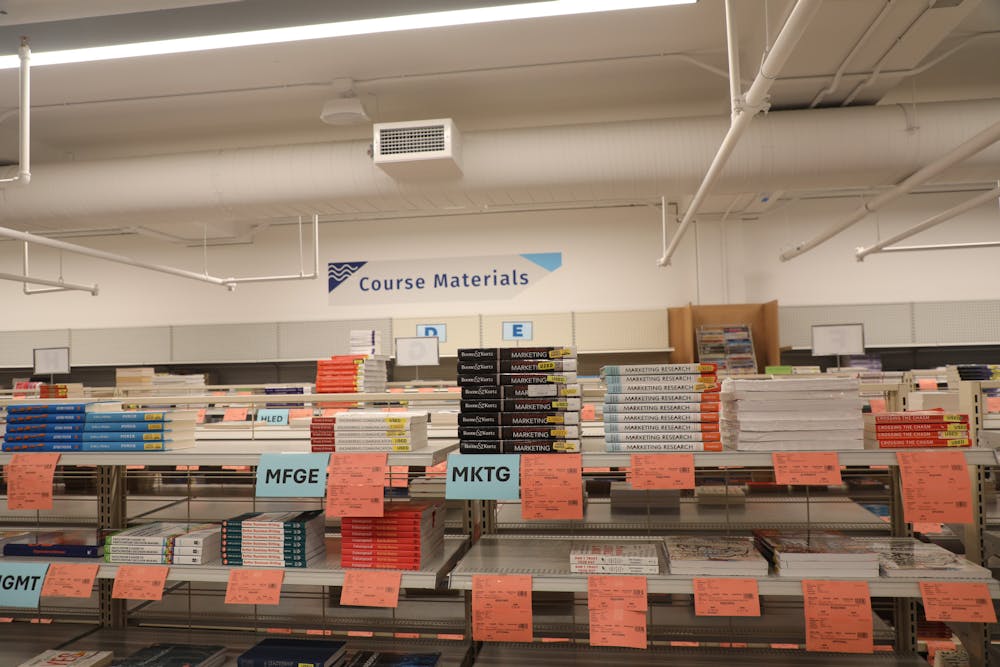As the winter quarter is rapidly approaching at Western Washington University, thousands of students are heading to the Associated Students Bookstore to purchase their textbooks for the quarter. With issues like rising prices and insufficient supplies, is the AS Bookstore still the best place for students to buy their books?
Carrying items from stickers to notebooks, the bookstore is intended to be the go-to option for school supplies on campus. Open since 1910, it strives to supply students and staff with any supplies they may need while working at Western.
While student bookstores can be found on college campuses, they are seemingly becoming more obsolete each year. According to a 2022 study done by Bates College, a private university located in Maine, 42.5% of respondents said that they choose not to shop at their student bookstore due to rising prices.
Those feelings are shared by some Western students as well, with some saying that their experience at the AS Bookstore was worsened by supply issues.
“I do wish it was cheaper,” said Lily Airey, a second-year student at Western. “I was trying to rent a used book and they were out of stock, so I had to pay $260 for a brand new textbook when I didn't ask for that.”
While the AS Bookstore tries its best to prevent situations like this, running out of a certain book is sometimes unavoidable. Due to fluctuating class sizes and rising shipping costs, ordering too many – or not enough – copies can be detrimental to the bookstore’s budget.
“For us, it's kind of trying to find the sweet spot between not having a whole bunch of books left and having just the right number of books on the shelf,” said Ueli Stadler, general manager of the AS Bookstore.
When it comes to prices, there isn’t much that the AS Bookstore can do. With many instructors working directly with publishers and e-books on the rise, the AS Bookstore doesn’t have quite the amount of business that it once had.
“In the good old days 30 years ago, it was very easy to make money in the college bookstore in general,” Stadler said. “With everyone switching to electronic [textbooks], the margins have grown a lot smaller.”
So where can students go to avoid these higher prices? One option is through Western’s library system. One of the many resources the library has at its disposal is Summit, an online collection that searches other libraries for books.
“Sometimes, students can find course resources by searching the library’s catalog and using Summit to request to borrow books owned by other libraries,” said Clarissa Mansfield, library communications manager at Western Libraries.
Through Summit, students can order books from any other library in the Orbis Cascade Alliance, which is a collection of 38 other libraries in the Pacific Northwest.
Some students also use online sites to find their books.
“I use this thing called Thriftbooks.com, it's where you can find used books online for pretty cheap,” said Western second-year Dawson Moore. “I always look for used books because they are better for the environment and they tend to cost less.”
Now is as good a time as ever for Western students to be cutting costs. Western’s 2023-24 Operating Budget Report recommended that resident undergraduate tuition be raised by 3% and non-resident undergraduate tuition be raised by 3.5% for the 2023-24 school year. This comes after another tuition increase last year, with resident undergraduate tuition being increased by 2.4% and non-resident undergraduate tuition being increased by 3.5%.
To those using student aid, tuition increases make it harder for them to buy their books. As tuition increases, the amount of loans that a student may need to take out also increases. According to Janelle Wertzberger, assistant dean and director of scholarly communications at Gettysburg College and presenter of the Bates College study, students who use loans and scholarships to pay for their tuition may pay the most for their books.
“We believe it’s because students who pay with scholarships/loans are often restricted to campus bookstores, where prices tend to be higher and format options are often fewer,” said Wertzberger.
According to Western, more than 60% of their students receive financial aid to help pay for college expenses, such as tuition, books, housing and food.
One option that could help students offset the price of their books is the AS Bookstore’s textbook buyback program. During finals week of each quarter, the AS Bookstore allows students to bring in any textbooks they no longer need and will potentially buy them back. Once bought back, the book may stay at the bookstore to be used in the following quarter, or it may be sold to a used book wholesaler.
More information regarding the buyback program may be found on the AS Bookstore’s website.
Aidan Hadley (he/him) is a campus life reporter for The Front this quarter. He is a third-year student at WWU studying news/editorial journalism. Outside of reporting, Aidan enjoys baking, eating good food and finding a new TV show to watch. You can reach him at aidanh.thefront@gmail.com.






